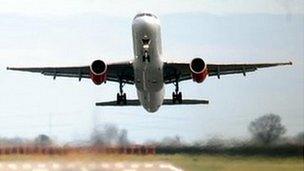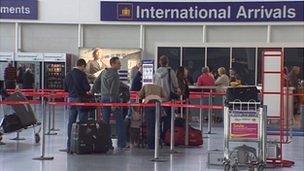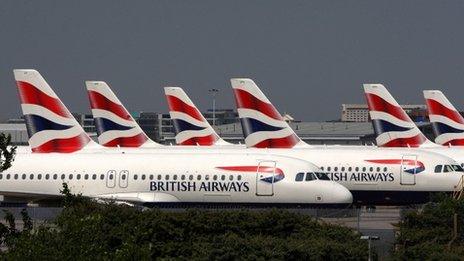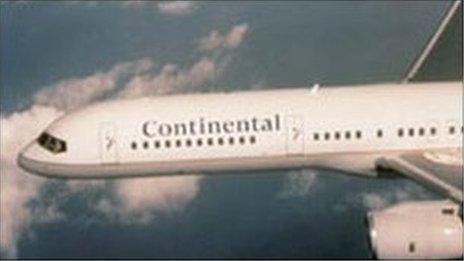Call for air tax rise to be scrapped to boost economy
- Published
- comments

Every air passenger will have to pay more in duty from April 2012
It seems it's now in the nature of Budgets that just as one approaches, the tax rises from Budgets past come back to haunt us.
One increase that's been in the offing for a while affects how much we all pay to fly.
The Chancellor, external announced last year that air passenger duty would be rising by around 8%, and despite intense lobbying from the aviation industry, he hasn't changed his mind.
Tax increase
Assuming, the airlines choose to pass it on, the tax will increase the price of every flight from April.
On a European flight, it'll add a fairly modest £1 to every economy flight, making the duty a total of £12.
Travellers to the US will pay an extra £5 in economy, raising the duty on each flight to £65.
The duty on the cheapest flights to the Caribbean will cost an extra £6, making the duty £81.
While long haul travellers to places like Australia will have to stump up at least another £7 in tax, taking the total duty per flight to a minimum of £92.
If you want more leg room, or fancy the luxury of business class, those rises are even steeper.
Painful for travellers then, and you won't find many people keen to pay it.
Hitting business
But there's also concern that the tax is harming businesses and holding back economic recovery.
April's rise is the third hike in three years, and it's now the highest rate in Europe. Some now want to see it not just cut but scrapped.
A report for the World Travel and Tourism Council, external estimates that scrapping the tax could create 90,000 jobs and boost the economy to the tune of £4 billion.
The council's president David Scowsill said: "Air passenger duty is a completely disproportionate tax on people's holidays and is hitting business travel hard. When the economy needs help, it is economically illogical to continue with it."
Some businesses in the North East of England certainly sympathise with that point of view.
At the very least they would like to see the planned rise abandoned but they are also campaigning for the air tax system to be reformed to help regional airports.
The North East Chamber of Commerce, external believes duty should be cut for the likes of Newcastle and Durham Tees Valley to help a region which has the highest unemployment rate.

Businesses in the North East argue that air taxes should be cut for regional airports like Newcastle
It says the current regime is putting airlines off running services from the North East, making the region less competitive.
Head of Policy, Ross Smith, said: "It is obviously a burden on individual businesses in that it adds an extra cost, but our greater concern is the burden it places on airlines which could come into the North East.
"If it means they are going to put their flights into other locations because of the extra cost then that will put our competitiveness at serious risk in the future."
Repeated rises
The chamber argues that cutting the duty for regions, external would help move services from congested Heathrow to airports like Newcastle which have spare capacity.
It's not as off-the-wall as it sounds as Northern Ireland has been given the power to cut its duty to help compete with lower rates in the Republic, and Scotland is also pushing for the same concession.
The problem is this is a tax that is also raising a considerable amount of money for George Osborne.
In 2001, it brought in around £800 million to the Treasury's coffers, but because of the repeated rises, it's estimated it'll bring in £2.8 billion this year.
And there are those who believe cutting air taxes would send out the wrong message.
The Green Party, external says the duty could be reformed, but not cut. In fact, it believes we don't pay enough when we fly. It points out that aviation fuel is currently exempt from VAT.
North East spokesman Nic Best said: "Air passenger duty isn't just another random revenue-raising tax the government thought up, it's a carbon tax.
"It's there deliberately to discourage what is a high carbon-emitting form of transport. Although it's a painful medicine, the illness of climate change will do far more damage to the national and international economy."
And it does seem likely at the moment that the only way is up for air passenger duty.
The industry will be watching the Budget carefully to see if another rise is in the offing.
And if you're feeling smug because you've already booked your flight, don't feel too comfortable.
The latest rise will apply to all flights after April 1, regardless of when they were booked.
- Published12 March 2012
- Published17 November 2011

- Published1 November 2011
